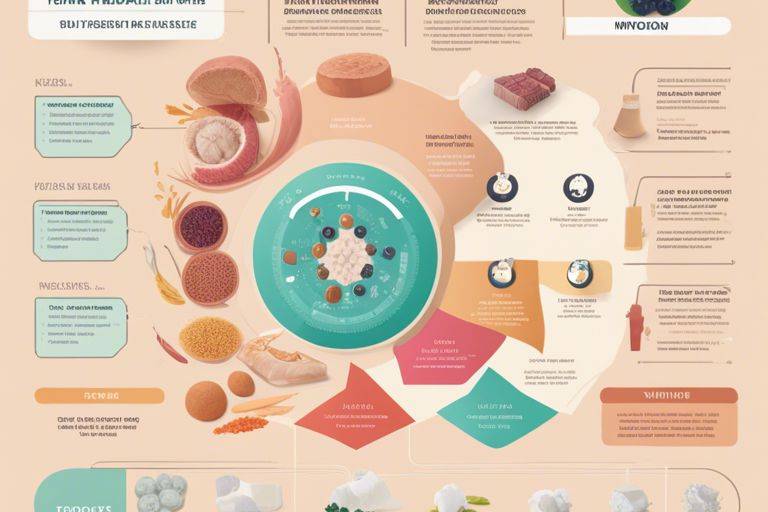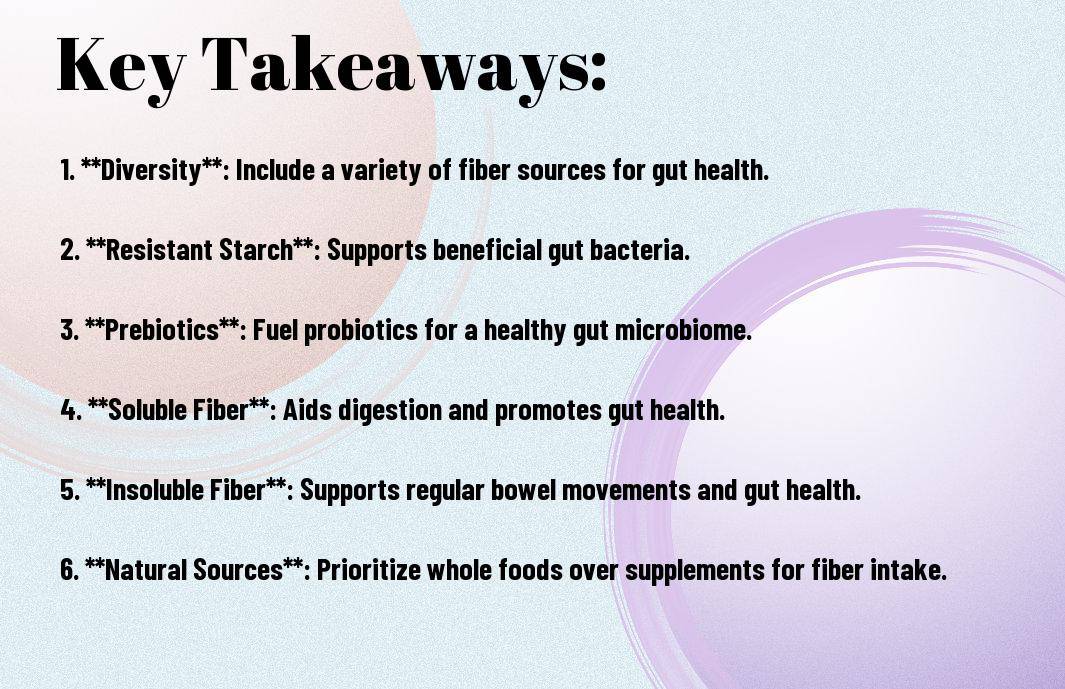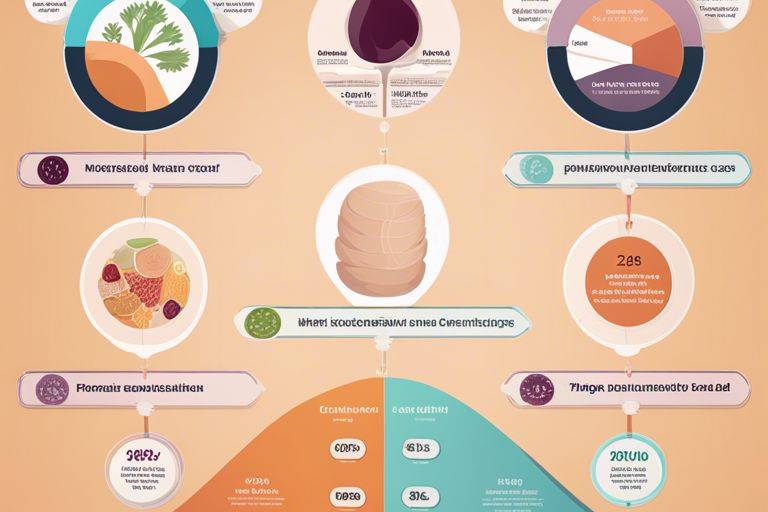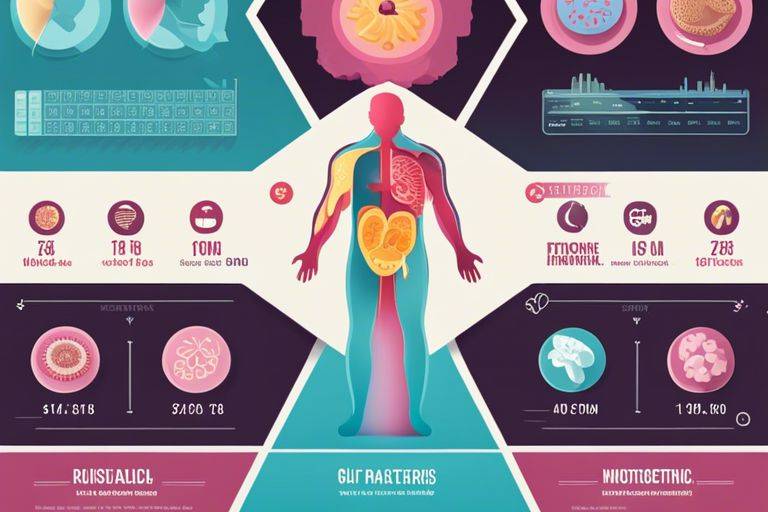There’s one key element that plays a vital role in optimizing your gut health – fiber. As I research into the world of microbiome wellness in 2024, I pay close attention to the fibers that I never ignore for optimal gut health. To learn more about the importance of fiber for your microbiome health, check out What is Fiber and Why is it Important for the Microbiome?.

Key Takeaways:
- Prebiotic Fibers: Essential for promoting the growth of beneficial gut bacteria.
- Resistant Starch: Helps improve insulin sensitivity and supports healthy digestion.
- Psyllium Husk: A soluble fiber that aids in bowel regularity and supports heart health.
- Chicory Root: Contains inulin, a prebiotic fiber that nourishes gut bacteria and enhances digestion.
- Glutamine: Supports gut integrity and repair, crucial for a healthy digestive system.
- Chia Seeds: Rich in fiber and omega-3 fatty acids, beneficial for gut health and overall well-being.
- Methylcellulose: A bulk-forming fiber that can help relieve constipation and promote satiety.


The Importance of Gut Health
The Gut-Brain Connection
To optimize your gut health, it’s crucial to understand the intricate connection between your gut and brain. Your gut is often referred to as your “second brain” because of the gut-brain axis, a bidirectional communication system linking your emotional and cognitive centers with intestinal functions. Stress and anxiety can disrupt this delicate balance, leading to digestive issues and impacting your overall well-being. That’s why I never ignore the importance of nurturing my gut for a healthy mind and body.
The Impact of Gut Health on Overall Well-being
Health
It’s astounding to realize the profound impact gut health has on your overall well-being. A healthy gut microbiome not only aids digestion and nutrient absorption but also plays a vital role in regulating your immune system and mood. Imbalances in gut bacteria can lead to a host of health issues, including inflammation, autoimmune conditions, and mental health disorders. By prioritizing a diet rich in fiber, probiotics, and prebiotics, you can support a diverse and resilient gut microbiota, enhancing your immune function and mental wellness.
Fiber-Rich Foods for Optimal Gut Health
Even Reviews: Hack Your Health: The Secrets of Your Gut emphasize the importance of incorporating fiber-rich foods into your diet for optimal gut health. Fiber is crucial for digestive health, maintaining a healthy gut microbiome, and overall well-being.
Soluble Fiber Sources
With various options like oats, nuts, seeds, and fruits such as apples and berries, soluble fiber helps to slow down digestion, promoting a feeling of fullness and supporting healthy blood sugar levels.
Insoluble Fiber Sources
With choices like whole grains, vegetables, and legumes, insoluble fiber adds bulk to your stool, helping with regular bowel movements and preventing constipation.
This type of fiber does not dissolve in water, aiding in efficient digestion and preventing digestive issues like irritable bowel syndrome.
Fermentable Fiber Sources
Sources rich in fermentable fibers include onions, garlic, leeks, and certain whole grains like barley and rye. These fibers are broken down by gut bacteria into short-chain fatty acids, which provide energy for the cells lining your colon and support a healthy gut microbiome.
A diet rich in fermentable fibers can help reduce inflammation in the gut, improve the absorption of nutrients, and enhance overall digestive health. Include a variety of these fiber sources in your meals to promote a flourishing gut environment.
The Top Fibers for Gut Health
Many studies have shown the importance of dietary fiber in promoting good gut health. According to Promoting beneficial gut microbes with whole-food dietary fiber, including a variety of fibers in your diet can help support a healthy gut microbiome.
Psyllium Husk
An excellent source of soluble fiber, **psyllium husk** acts as a prebiotic, feeding the beneficial bacteria in your gut. It can help improve bowel regularity and support overall gut health.
Oat Fiber
Any discussion about optimal gut health must include **oat fiber**. Oats are rich in beta-glucans, a type of soluble fiber that has been linked to improved digestion and a healthy gut microbiome.
The beta-glucans in oats have also been found to support heart health by helping to lower cholesterol levels.
Pectin
Husk pectin is a type of soluble fiber found in fruits like apples and citrus fruits. **Pectin** can help regulate digestion by supporting the growth of beneficial gut bacteria.
Fibers like pectin can also help reduce inflammation in the gut and improve overall digestive health.
Inulin
Any discussion about optimal gut health must include **Inulin**. This prebiotic fiber is found in foods like onions, garlic, and bananas, and acts as a fertilizer for the good bacteria in your gut, helping to promote a healthy balance of microflora.
Pectin can also help improve mineral absorption in the gut and support immune function.
Fructooligosaccharides (FOS)
The **Fructooligosaccharides (FOS)** are another type of prebiotic fiber that can help feed the beneficial bacteria in your gut. They are found in foods like bananas, garlic, and onions and can contribute to a healthy gut microbiome.
For instance, supplementing with FOS may help alleviate symptoms of irritable bowel syndrome and improve overall gut function.
How Fibers Support Gut Health
Prebiotic Effects
Effects of fiber on gut health extend to its prebiotic effects, nourishing the beneficial bacteria in your gut. By fermenting fiber, these bacteria produce short-chain fatty acids like butyrate, enhancing gut barrier function and reducing inflammation.
Probiotic Support
Any healthy gut regimen must include probiotic support, and fibers play a crucial role in this. They act as food for probiotics, promoting their growth and activity, improving overall gut health and immune function.
Another way fibers support gut health is through promoting regularity and healthy gut motility. High-fiber foods add bulk to the stool, aiding in its passage through the digestive system and preventing issues like constipation.
Gut Motility and Regularity
The high fiber content in your diet can significantly impact your gut motility and regularity. It helps keep your digestive system running smoothly, reducing the risk of gastrointestinal issues and promoting overall gut health.
Inflammation Reduction
Prebiotic fibers have a remarkable effect on reducing inflammation in the gut. Studies have shown that a diet rich in fiber can lower levels of inflammation markers and promote a healthy balance of gut bacteria, crucial for overall gut health.
Fibers are the unsung heroes of gut health, playing a multifaceted role in nourishing probiotics, promoting regularity, and reducing inflammation. Ensure you include a variety of sources in your diet to support optimal gut health in 2024.
Incorporating Fibers into Your Diet
Whole Foods vs. Supplements
After focusing on incorporating more fibers into my diet, I’ve found that whole foods are the way to go. While supplements can be convenient, whole foods provide a wide range of nutrients and other beneficial compounds that supplements may not offer.
Gradual Introduction to Avoid Discomfort
The gradual introduction of new fibers into your diet can help prevent discomfort such as bloating and gas. This approach allows your gut microbiota to adjust slowly to the increased fiber intake, reducing the likelihood of negative side effects.
The key is to slowly increase your fiber intake over several weeks to give your digestive system time to adapt. Start by introducing small amounts of high-fiber foods and gradually increasing the portion sizes as your body becomes more accustomed to the change.
Meal Planning and Recipes
Fibrous foods should be an necessary part of every meal for optimal gut health. Recipes that incorporate a variety of fiber-rich ingredients can help you get creative in the kitchen while improving your digestion.
Meal planning is necessary for ensuring you get a good balance of fibers throughout the day. By preparing meals ahead of time and including a mix of fruits, vegetables, whole grains, and legumes, you can easily meet your fiber goals and support a healthy gut.

Common Mistakes to Avoid
Overreliance on Supplements
Your quest for optimal gut health should not solely rely on supplements. While they can be beneficial, overreliance on supplements can lead to neglecting the importance of a balanced diet rich in fibers, prebiotics, and probiotics. It’s imperative to remember that supplements are meant to complement, not replace, a healthy and varied diet.
Ignoring Other Nutrient Deficiencies
With a focus on fibers for gut health, it’s easy to overlook other nutrient deficiencies that could impact your overall well-being. Nutrients like vitamin D, magnesium, and omega-3 fatty acids play crucial roles in gut health and the body’s immune system. It’s important to ensure a well-rounded intake of imperative nutrients to support optimal gut function.
Mistakes: Ignoring Other Nutrient Deficiencies can hinder your journey towards optimal gut health. It is imperative to recognize that a diverse and nutrient-rich diet is key to supporting overall well-being. By solely focusing on fibers, you may miss out on imperative vitamins and minerals that are vital for gut health and immune function.
Not Addressing Underlying Health Issues
Health is not just about diet; not addressing underlying health issues can significantly impact your gut health. Conditions like stress, lack of sleep, and unresolved digestive problems can disrupt the balance of your gut microbiota. It’s crucial to address these issues with the help of healthcare professionals to achieve holistic gut wellness.
Underlying: Underlying health issues can manifest in various ways, affecting gut health and overall well-being. By addressing these issues, you can create a solid foundation for gut health and pave the way for optimal digestion and nutrient absorption. Be mindful of, a holistic approach to health is vital for achieving optimal gut function.
To wrap up
As a reminder, focusing on a variety of fibers like prebiotic fibers, insoluble fibers, and resistant starches is vital for optimal gut health in 2024. Remember to include whole foods like fruits, vegetables, legumes, and whole grains in your diet to support a diverse gut microbiome and overall well-being. Here’s to a healthy gut and a healthier you!
FAQ
Q: What are the fibers to never ignore for optimal gut health in 2024?
A: The fibers to never ignore for optimal gut health in 2024 are prebiotic fibers, soluble fibers, resistant starch, inulin, fructooligosaccharides (FOS), and beta-glucans.
Q: Why are prebiotic fibers important for gut health?
A: Prebiotic fibers are important for gut health as they serve as food for the beneficial bacteria in the gut, which helps in promoting a healthy gut microbiome and supporting digestion and overall health.
Q: What are soluble fibers and how do they benefit gut health?
A: Soluble fibers are fibers that dissolve in water to form a gel-like consistency in the gut. They benefit gut health by promoting satiety, regulating blood sugar levels, and supporting the growth of beneficial bacteria in the gut.
Q: How does resistant starch contribute to optimal gut health?
A: Resistant starch acts as a prebiotic, nourishing the good bacteria in the gut and promoting their growth. It also helps in improving digestion, supporting gut health, and enhancing overall well-being.
Q: What is the role of inulin in promoting gut health?
A: Inulin is a type of prebiotic fiber that supports the growth of beneficial bacteria in the gut, improves digestion, enhances nutrient absorption, and boosts immune function, thereby promoting optimal gut health.
Q: How do fructooligosaccharides (FOS) benefit gut health?
A: Fructooligosaccharides (FOS) are prebiotic fibers that stimulate the growth of beneficial bacteria in the gut, support the production of short-chain fatty acids, improve gut integrity, and help in maintaining a healthy gut microbiome.
Q: What are beta-glucans and how do they contribute to gut health?
A: Beta-glucans are a type of soluble fiber that promotes the growth of beneficial bacteria in the gut, supports immune function, helps in regulating cholesterol levels, and contributes to optimal gut health by enhancing gut microbiota diversity.



